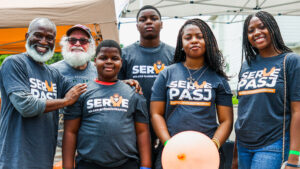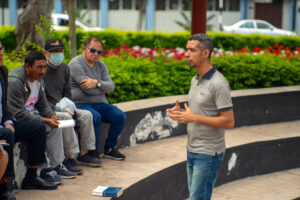
WILLOW, Alaska (BP)–Courage and discipline undergirded by her Christian faith has enabled DeeDee Jonrowe to excel in the rigorous sport of Alaskan sled-dog racing.
Love — for God, people and animals – tempers the competitive nature that has empowered Jonrowe, a Southern Baptist, to become a world-class athlete and sought-after motivational/inspirational speaker.
Jonrowe has participated in 17 Iditarod competitions, a grueling, mid-winter sled-dog race over 1,100 miles of jagged mountain ranges, frozen rivers, dense forests, desolate tundra and windswept coast between Anchorage and Nome.
Jonrowe’s career includes second-place Iditarod finishes in 1993 and 1998 and Most Inspirational Musher honors in 1993 and the Humanitarian Award at the 1991 Iditarod.
The Iditarod, known as the “Last Great Race on Earth,” has won worldwide acclaim and interest because of its rugged-terrain challenge: temperatures far below zero, winds that can cause a complete loss of visibility, long hours of darkness, treacherous climbs — spanning about 11 days, more or less.
“You win when you simply don’t allow yourself to stop trying,” Jonrowe said. “If you allow yourself to give in, to stop fighting, the race just seems longer, the miles get long, the days pass slowly, and every hill is so much higher.”
Though she was speaking specifically about the Iditarod, her words could be an analogy for the Christian faith, said Jonrowe, who intertwines her rock-solid dependence on God with her athletic experiences during many of her speaking engagements each year.
With the conversation turning to aging, Jonrowe raced the Iditarod and several shorter sled dog races last winter despite having back surgery last year in her mid-40s.
“I just push through the pain,” she said. “Giving up is not an option. You have to take healing on like a job. You have to be diligent and faithful of taking care of what you have.
“Aging is a natural process,” she continued. “Just like if you don’t pay attention to your faith and you’re sloppy with your faith, you lose your strength that comes from daily meditation and daily time with God. If you don’t take care of your body, the next thing you know, it’s weak.”
Jonrowe was in a major car accident in which her grandmother was killed, her husband, Mike, critically injured and her intestines ruptured in the fall of 1996.
“God brought us out of there,” Jonrowe said. “We were trapped in a car at 30 below. I cried out to God in a moment when nothing else could help me and God delivered my husband back to me.”
Jonrowe lives her faith every day, said Jerry Pinkerton, her pastor at Big Lake Baptist Church near Wasilla, Alaska.
“DeeDee has gone through some very, very tough times and has come out stronger for them,” Pinkerton said. “She believes and trusts and I think she’s one of the most godly, faithful, Christlike women I have ever known. God is faithful, just, righteous, dependable — all those things DeeDee is. I think she has those God-like characteristics that make her a godly woman.”
Jonrowe credits her parents for her victorious mind-set.
“I guess my mother and father both have set wonderful examples for me both spiritually and physically,” she said. “Neither one of them had an easy family life but they never used it as an excuse to explain away weaknesses. My father’s mother died when he was 4 years old.”
Her father, Ken Stout, now retired from the Army as a lieutenant colonel, and his wife, Peg, reared their two daughters on a succession of 22 military posts.
“Dogs were an intimate part of what was stable in my life,” Jonrowe said. “I got my first one when I was six weeks old.
“Looking back on it, I think my mother used pets to teach values to my younger sister Linda and me,” Jonrowe reflected. “By caring for our pets, we were taught to be loving and unselfish, to share, and to put a living thing before our own more selfish interests. It was a good way to learn responsibility.”
She moved with her parents to Anchorage in 1971 and started dogsled racing in 1979. Before that, her use of sled dogs was more practical: “We were living in western Alaska, where there were basically no roads. We usually traveled by snow machine and plane. I started the dogs as a hobby.
“I began my own breeding program several years later with the goal of breaking into the top echelon of mushers with all my own dogs,” she continued. “The key is to match what you want from the dogs with your own personality.”
The skill and endurance she developed along with her Alaskan sled dogs — which are a breed separate from huskies — enabled Jonrowe to finish among the top 10 competitors in 11 of her 17 Iditarods and to win the 1989 Beargrease 330-mile sled dog race, still remaining the event’s record holder.
She’s a past member of the Iditarod board of directors and a member of the veterinary committee of the Iditarod Trail Committee Inc. She is also a charter member of PRIDE (Providing Responsible Information on a Dog’s Environment) and is a favorite among sled dog race spectators.
“Dog care is first and foremost the principle of dog racing,” Jonrowe said. “Competitors may get tired, intense and short-tempered with each other, but not with their dogs. It’s not permitted.
“Obviously a talent to work with animals is not a talent everyone has,” she added. “It’s a gift from God. And when God gives you a talent and strength in an area, he does so in an area that is useful to him.”
Her high profile as a top Iditarod competitor who openly proclaims her faith may be what God finds useful.
“My heart’s desire is to win the Iditarod and yet I can feel the intensity of [the Apostle] Paul’s words in Acts,” Jonrowe said. “When he says, ‘I consider my life worth nothing to me, if only I may finish the race and complete the task the Lord Jesus has given me, the task of testifying to the gospel of God’s grace.’ Acts 20:24.”
Jonrowe keeps a kennel of about 100 dogs, mostly Alaskan sled dogs, although her house dogs are Labradors — one yellow and three black labs. The kennel includes racing, breeding, younger and retired dogs, 32 of which train for nine months specifically for the Iditarod, though ultimately only 16 dogs will be in the big race.
They start serious training as two teams in July, with hours — sometimes days — of running. By the time of the Iditarod in early March, each team will have mushed at least 1,800 miles under training conditions. This means Jonrowe gets in 3,200 miles of training, since she works both teams.
In addition to training practice, Jonrowe races some of her dogs in each of two 50-mile and two 300-mile competitions.
“It’s like kids trying out for the varsity team,” Jonrowe said. “Over time you come to see which dogs work best together, which dogs have the capability and drive to be part of a winning sled dog team.”
Training racers is just one part of owning a 100-dog kennel. In the winter, two helpers join Jonrowe in feeding, cleaning, grooming and even massaging the feet of her dogs — who go through several pair of booties a day during the Iditarod. Husband Mike also helps, when he’s not out on Bristol Bay in K-3, his commercial fishing boat, netting salmon and herring.
“The sweetness of the dogs and the bond with the dogs is what it’s all about,” DeeDee said. “It’s a companionship and bond, and emotional give and take, that makes this sport unique. I am much more motivated when I have dogs to share it with.”
Again she turns the conversation to the spiritual.
“Something I once heard brings to mind how I actually feel racing dogs, that God’s bigness is brought out in my smallness,” Jonrowe said. “The magnitude of what God can do is shown by the weakness that I have. The competition I compete in isn’t anything different than life. It has its hills and its mountains and its valleys and its flats and its boring times and its particularly stressful times.
“The mountains are just as high for me as they are for anybody else, and the valleys are just as low, and the obstacles just as difficult,” Jonrowe said. “But because I know that I, of myself, can’t do this, I rely on God right off the bat.”













